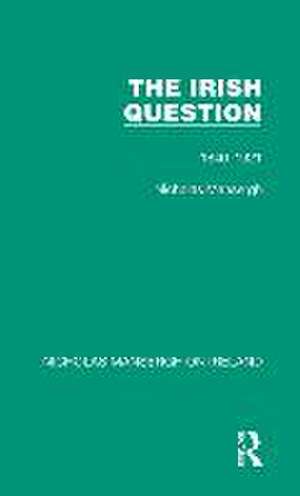The Irish Question: 1840-1921: Nicholas Mansergh on Ireland: Nationalism, Independence and Partition
Autor Nicholas Manserghen Limba Engleză Hardback – 14 noi 2022
| Toate formatele și edițiile | Preț | Express |
|---|---|---|
| Paperback (1) | 194.34 lei 43-57 zile | |
| Taylor & Francis – sep 2024 | 194.34 lei 43-57 zile | |
| Hardback (1) | 631.06 lei 43-57 zile | |
| Taylor & Francis – 14 noi 2022 | 631.06 lei 43-57 zile |
Preț: 631.06 lei
Preț vechi: 946.17 lei
-33% Nou
Puncte Express: 947
Preț estimativ în valută:
120.76€ • 125.37$ • 100.70£
120.76€ • 125.37$ • 100.70£
Carte tipărită la comandă
Livrare economică 24 martie-07 aprilie
Preluare comenzi: 021 569.72.76
Specificații
ISBN-13: 9781032352558
ISBN-10: 1032352558
Pagini: 342
Dimensiuni: 138 x 216 mm
Greutate: 0.79 kg
Ediția:1
Editura: Taylor & Francis
Colecția Routledge
Seria Nicholas Mansergh on Ireland: Nationalism, Independence and Partition
Locul publicării:Oxford, United Kingdom
ISBN-10: 1032352558
Pagini: 342
Dimensiuni: 138 x 216 mm
Greutate: 0.79 kg
Ediția:1
Editura: Taylor & Francis
Colecția Routledge
Seria Nicholas Mansergh on Ireland: Nationalism, Independence and Partition
Locul publicării:Oxford, United Kingdom
Public țintă
General, Postgraduate, and UndergraduateCuprins
Part 1: Ireland Under the Union: The Opinions of Some Contemporary Observers 1. The State of Ireland in the Early Years of Union: Contemporary Observations and some Reflections Upon Them. 2. European and Irish Nationalisms: The Views of Italian Nationalists on the Nature of the Irish Question 3. The Communist International and the Irish Question Part 2: Reform: English Statesmen and the Repeal of the Union 4. The Liberal Conversion to Home Rule 5. Some English Statesmen and the Irish Question 1880-1914 6. The Ulster Question, 1886-1921 Part 3: Revolution: Domestic and External Forces 7. The Political, Economic and Social Background to the Sinn Fein Revolution 8. The Influence of the Romantic Ideal in Irish Politics 9. The Irish Question in World Politics 10. Some General Reflections on the Development of Anglo-Irish Relations, 1840-1921.
Recenzii
Reviews for the original edition of The Irish Question:
‘…his extraordinarily stimulating book…the first sustained analysis of the modern Irish question…’ F. S. L. Lyons, New Statesman
‘This is a book distinguished by learning lightly borne, a searching and critical mind, mellowness of judgement and a sympathetic, constructive and illuminating approach to its subject. It is by far the best book of its kind on offer.’ T. W. Moody, Irish Historical Studies
‘…this is one of those very readable books which help to broaden one’s horizons and enrich one’s perspectives in the study of Irish history.’ Donal McCartney, Irish Independent
‘…a very discerning yet sympathetic book.’ E. G. Collieu, The Listener.
‘…his extraordinarily stimulating book…the first sustained analysis of the modern Irish question…’ F. S. L. Lyons, New Statesman
‘This is a book distinguished by learning lightly borne, a searching and critical mind, mellowness of judgement and a sympathetic, constructive and illuminating approach to its subject. It is by far the best book of its kind on offer.’ T. W. Moody, Irish Historical Studies
‘…this is one of those very readable books which help to broaden one’s horizons and enrich one’s perspectives in the study of Irish history.’ Donal McCartney, Irish Independent
‘…a very discerning yet sympathetic book.’ E. G. Collieu, The Listener.
Notă biografică
Tipperary born historian Nicholas Mansergh (1910 – 1991) wrote extensively on the process of decolonisation, the prelude to it, and its aftermath. Well known works include The Irish Question 1840-1921, and The Commonwealth Experience. In 1953, he became Smuts Professor of Commonwealth History in Cambridge, and was Master of St. John’s College from 1969 to 1979. He was also editor in chief of the 12 volume record of official documents on India: the Transfer of Power 1942-47.
Descriere
Originally published in 1940 but here reissuing the revised third edition of 1975, this book analyses the Irish Question. The study is not a narrative history. While the problems with which it deals have been suggested by the period it covers, it is with the problems and not the period that it is focussed on.



